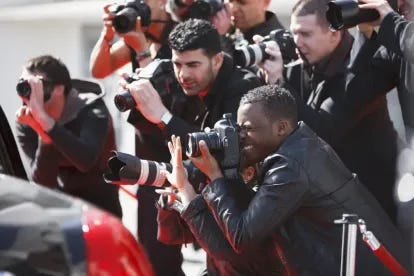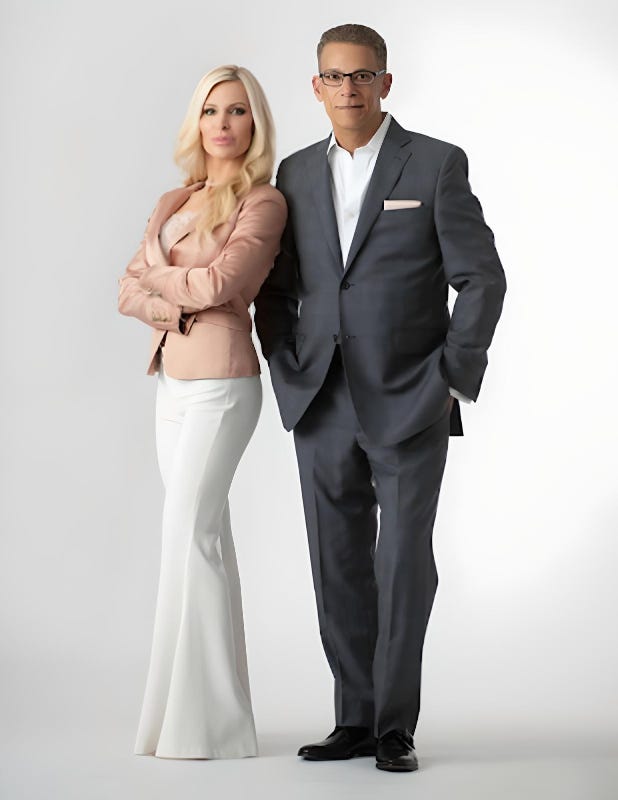Jennifer Couture v. TikTok's Danesh Noshirvan: Can You Successfully Sue For Online 'Doxxing'?
Florida Federal Court Judge Sheri Polster Chappell Considers Emerging Social Media and Internet Law Issues

By Richard Luthmann
Jennifer Couture is a Florida woman who gained attention on TikTok following a viral video that showed her involved in an assault outside a local Dunkin Donuts.

The video was posted by a TikTok user named Danesh Noshirvan, who specializes in “cancel culture” content. Noshirvan goes beyond public shaming and engages in a practice called “doxxing,” which is the act of publicly revealing personally identifiable information about an individual or organization, usually via the Internet and without their consent to do so.
Doxxing is an unsettled and emerging area of Internet law. Couture and her plastic surgeon employer fought against Noshirvan’s TikTok content by lodging a civil lawsuit. Federal District Court Judge Sheri Polster Chappell is currently considering the case in the Middle District of Florida.
What Happened?
Social Media Influencer Daneesh Norvishan goes by the TikTok handle ThatDaneshGuy. He provides an attractive service, combining “revenge for hire” with “cancel culture.” If someone has wronged you, Norvishan will publicly shame them - if the price is right. He monetizes his work through TikTok's platform, which includes gifts, tips, and subscription fees from his 1.7 million followers.
Recently, Norvishan “doxxed” an Internet “Karen” named Jennifer Couture. She assaulted and then tried to back her car into a woman in a Fort Myers, Florida parking lot.
The video shows Couture exiting her black Mercedes SUV and approaching an unidentified individual’s car while using obscenities. The nature of the dispute is unclear, but the video captures Couture attempting to grab the person's phone and later backing up her SUV in an apparent attempt to hit them.
Noshirvan then edited and reposted the video on TikTok, overlaying it with Couture's personal information, including her name, contact details, employer, and other private information, effectively doxxing her.
This action led to Couture facing severe harassment from Noshirvan's followers, who sent her numerous berating texts and phone calls. They also targeted her family, the schools her children attended, and her employer, Garramone Plastic Surgery.
On Monday, Feb. 20, Couture was arrested by the Lee County Sheriff Carmine Marceno’s Office and charged with assault with a deadly weapon without intent to kill, burglary, and battery.
In April 2022, Couture pleaded guilty and was sentenced to two years probation. She was required to undergo anger management and random drug and alcohol screening, and she was banned from the Dunkin Donuts parking lot.
Couture and her Plastic Surgery employer (owned by her plastic surgeon boyfriend, Dr. Ralph Garramone) struck back in Federal Court for the Middle District of Florida. Earlier this year, they sued Noshirvan, TikTok, and its parent company for civil harassment-based claims and alleged harm.
Additionally, Couture and Garramone Plastic Surgery accused Danesh Noshirvan of engaging in doxxing and cyber harassment.
Escalating “Harassment” or “Citizen Journalism”
Couture claims Noshirvan’s harassment escalated as the TikToker posted a total of twelve videos about Couture over several months. He encouraged his followers to report Couture to Southwest Florida Crimestoppers.
Couture’s legal papers say Noshivan’s online taunts led to an onslaught of over 728 abusive messages and numerous threatening phone calls. Couture was falsely reported to the Florida Department of Children and Families that she had harmed her child, triggering a government investigation.
But in Noshivan’s defense, technological advances have enabled citizens with portable equipment to film and photograph significant events and incidents.
The term is “citizen journalism,” a recognized form of newsgathering. In 2021, Columbia University awarded Darnella Frazier the Pulitzer Prize, “[f]or courageously recording the murder of George Floyd, a video that spurred protests against police brutality around the world, highlighting the crucial role of citizens in journalists' quest for truth and justice.”
The posted video of Couture and Noshivan’s doxxing raises essential questions about legitimate newsgathering and information dissemination and what activity crosses the line into civilly actionable conduct.
Garramone Plastic Surgery's Business Turmoil
Garramone Plastic Surgery also claims harm at Noshirvan’s hands.
Noshirvan accused Garramone of slander and questioned the business's decision to take out a PPP loan. These allegations led to Garramone’s termination of contracts with surgeons concerned about reputational harm. Many patients canceled their scheduled procedures, Garramone alleges.
The business received calls, texts, emails, and negative online reviews due to Noshirvan's videos. In response to a negative review, Garramone clarified that the review was not from a former or current patient.
Couture and Garamone’s claims are against Noshirvan and TikTok, the social media platform, and ByteDance, Inc., TikTok’s parent company.
The legal action raises novel and critical legal issues about social media, free speech, and the limits of journalism.
Legal Issues Surrounding Doxxing
Is doxxing legal? The answer most lawyers will give is, “It depends.”
Doxxing became a significant issue during COVID-19, as public health officials faced enhanced risk, receiving responses that ranged from public criticism to threats and harassment.
Some states have specific laws against doxxing, often falling under cyberstalking or cyberharassment statutes. The penalties can range from fines to imprisonment, depending on the severity of the act and the harm caused to the victim.
Florida, where Couture’s videoed encounter occurred, has some legal protections against doxxing under its Cyberintimidation statute.
However, Noshirvan lives in Pennsylvania, where doxxing falls under the ambit of the general harassment statute. Noshirvan claims that his videos were broadcast, not targeted or directed at any person or group. Thus, he has not engaged in the specific and focused conduct necessary for a harassment charge under local law.
Is ‘Doxxing’ Protected By the First Amendment?
One of the complexities surrounding the legality of doxxing is the First Amendment, which protects freedom of speech and the press, among other rights. Courts must balance the right to free speech, press freedoms, or both against the right to privacy, blurring the boundaries and making legal outcomes less predictable.
The line between doxing and journalism isn't always straightforward, raising additional constitutional concerns. Noshirvan can claim that his videos about Couture are free speech and protected journalism. The matters are of public concern, particularly where Couture faced criminal charges.

But the constraints aren’t always explicit. A classic example is what happens if the paparazzi photograph a celebrity coming out of their home, and stalkers use details in that image to zero in on the celebrity. Is that doxxing? Many courts and commentators agree about the difficulty of a bright-line rule in these scenarios.
Civil Lawsuits as Potential Recourse?
While doxxing itself is not explicitly illegal under federal law, victims may have legal recourse under various privacy torts, such as "public disclosure of private facts" or "intrusion upon seclusion." These torts allow individuals to take civil action against those who have invaded their privacy unreasonably and highly offensively.
Additionally, several business torts are available as potential recourse if the doxxing affects existing economic arrangements or client relationships. These business torts include “tortious interference with contract” and “tortious interference with prospective business advantage.”
Couture and Garramone are testing the availability of these civil remedies in the case now before Florida Federal Court Judge Sheri Polster Chappell.
Judge Polster Chappell's Legal Assessment
The Couture v. Noshirvan case is pending in the Federal District Court for the Middle District of Florida. Judge Polster Chappell's recent decision provides a comprehensive insight into the challenges of addressing alleged online harassment and business torts in the age of social media.
In her ruling, Judge Polster Chappell considered Noshivran and the TikTok companies’ motion to dismiss Couture and Garramone’s amended complaint. They bring claims for cyberstalking, civil conspiracy, and tortious interference.
TikTok moved to dismiss, arguing that Section 230 (47 U.S.C. § 230) protects it from this lawsuit. Noshirvan moved to dismiss the amended complaint as a “shotgun pleading” and for failure to state a claim.
TikTok's Legal Immunity Under Section 230
The Court’s analysis began with the allegations against TikTok and its parent company, ByteDance, Inc., for their role in facilitating Noshirvan’s allegedly harmful actions. Congress has previously delineated the legal protections afforded to platforms like TikTok under Section 230, a key provision of the Communications Decency Act.
Here, Judge Chappell's application of Section 230 came into sharp focus. The statute generally provides immunity for online computer services concerning third-party content its users generate.
To get around Section 230, the plaintiffs suggested that TikTok’s “monetization scheme” contributed to the violation. This argument was raised in light of the Ninth Circuit’s 2021 ruling in Gonzalez v. Google. The West Coast-based Federal Appeals Court indicated that Section 230 may not shield platforms from claims based on revenue-sharing arrangements.
The Court didn’t buy the monetization argument. Judge Polster Chappell found that Section 230 shields online platforms like TikTok from liability for user-generated content, stating, “Nor do TikTok's monetization features transform it into a developer rather than publisher of Noshirvan's content."
Judge Polster Chappell confirmed the legal distinction between platform providers and content creators. This part of the ruling reiterates the established legal principle that platforms are not publishers and, thus, are not liable for the content created by their users.
As a result, the claims against TikTok and ByteDance were dismissed cold. Couture and Garramone have no further chance to amend their claims.
The Court’s decision underscores the robust legal protections currently afforded social media platforms. It also highlights a significant policy debate in Internet law about the extent of responsibility these entities should bear for their users' actions.
The Remaining Claims Against Noshirvan
Judge Polster Chappell meticulously examined the remaining claims against TikToker Noshivran for cyberstalking, conspiracy, and tortious interference.
Noshirvan argued the cyberstalking claim was fatally defective. Florida Statute § 784.048 is a criminal statute and does not provide for a civil cause of action for damages brought by private parties.
Judge Polster Chappell found the text of § 784.048 confirms this reading and dismissed the claim with prejudice. This means that Couture and Garramone’s cyberstalking claims have failed and cannot be saved by an amendment.
The Conspiracy Claim “Needs More Work”
As for the rest of the claims, the Court will give Couture, Garramone, and their lawyers one more chance to get their story straight.
“Plaintiff Couture’s conspiracy claim…needs more work,” the Court’s opinion said.
Legally speaking, Judge Polster Chapell reminded the plaintiffs of the requirement that every conspiracy action includes an “underlying tort.” Couture claimed she didn’t need to allege one under Florida’s “economic boycott exception.” However, the Court said the papers didn’t sufficiently spell that out.

While Garramone claimed defamation was the basis for the alleged conspiracy, the Plastic Surgery practice did not specifically make defamation a named claim. Nor did the pleadings detail how Noshirvan defamed Garramone, which is a legal requirement.
Analysis of Tortious Interference Claim
Garramone brought a tortious interference claim against Noshirvan. Judge Polster Chappell clarified the elements necessary for such a claim.
"The elements of tortious interference are '(1) the existence of a business relationship … (2) knowledge of the relationship on the part of the defendant; (3) an intentional and unjustified interference with the relationship by the defendant; and (4) damage to the plaintiff as a result of the breach of the relationship,' "the Decision said.
While acknowledging the potential impact of Noshirvan's actions, Judge Chappell dismissed the tortious interference claim due to a pleading defect. Garramone included insufficient evidence regarding Noshirvan's awareness of the business relationships he allegedly disrupted.

“Garramone includes only conclusory allegations about Noshirvan's knowledge of the business relationships," wrote Judge Polster Chappell.
However, the Court gave the plaintiffs one final opportunity to amend their complaint against Noshirvan.
“Plaintiffs must clean up the remaining portions of their complaint. Plaintiffs misnumbered several paragraphs (after paragraph 59, the complaint erroneously begins counting at 47)... Plaintiffs must correct this error. The complaint is also a shotgun pleading in that each successive count incorporates all preceding allegations,” the Court’s Decision said.
Judge Polster Chapell's willingness to consider a second amended complaint signifies an open door for the plaintiffs to bolster their claims with additional evidence or argumentation, possibly reshaping the case's trajectory.
Moving Forward
The Couture v. Noshirvan case illustrates the ongoing challenge of addressing harmful online behavior while contending with the protective shield granted to platforms by laws like Section 230. TikTok, the deep pocket, is out of the case.
The plaintiffs are preparing to amend their claims against Noshirvan. The legal community and observers will closely watch how this case evolves. It raises critical questions about the balance between protecting individuals from online harassment and respecting the legal frameworks that govern digital platforms. Noshirvan is expected to raise free speech and freedom of the press defenses later in the case.
The Broader Implications
The ruling in Couture v. Noshirvan is a window into the complexities of Internet law, particularly in cases involving online harassment and the role of social media platforms. The decision to allow an amendment to the claims against Noshirvan but not against TikTok due to Section 230 raises policy concerns about the.
Judge Polster Chappell's ruling demonstrates the nuanced Social Media legal landscape where individual accountability and platform immunity intersect and diverge.




